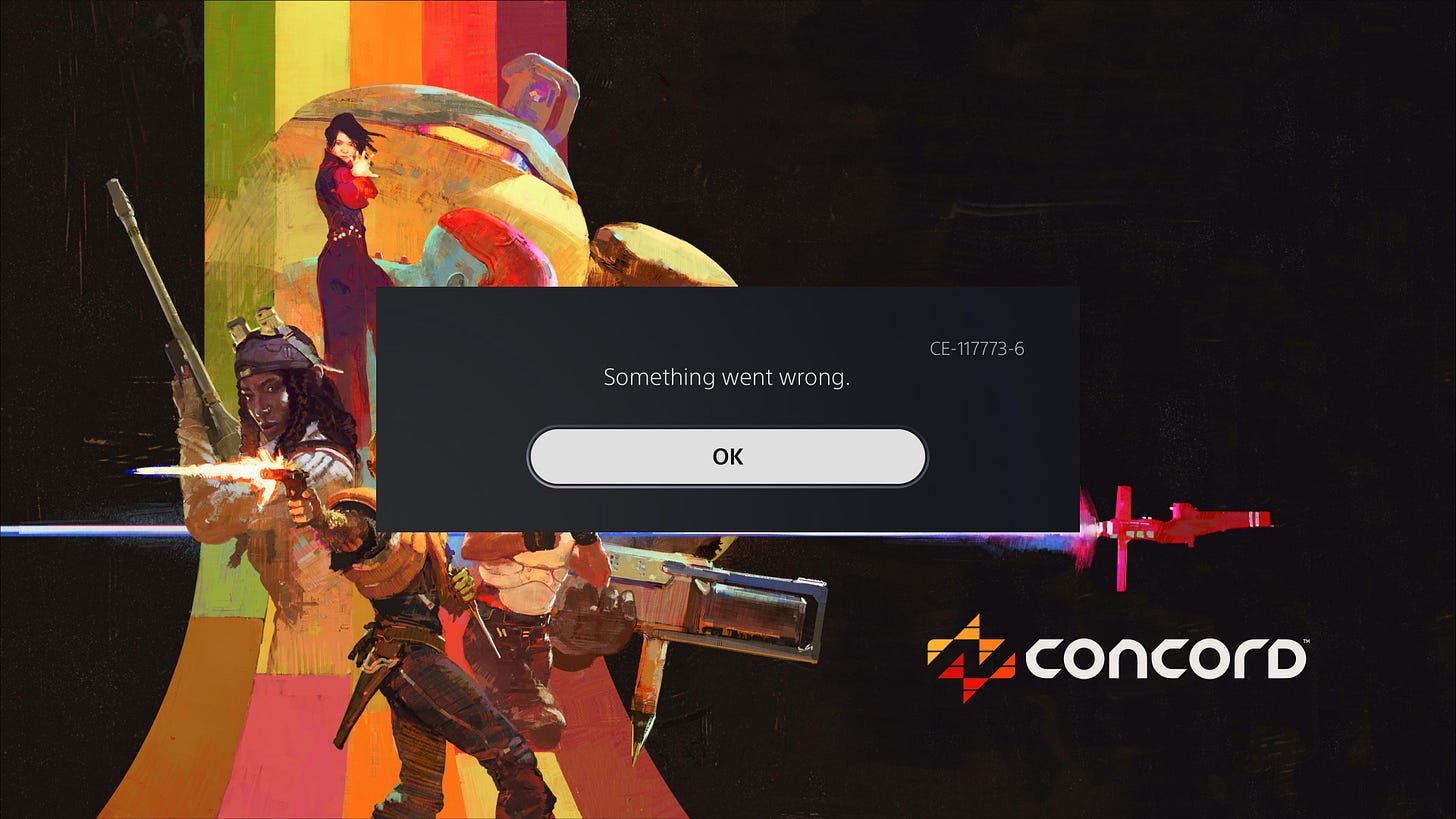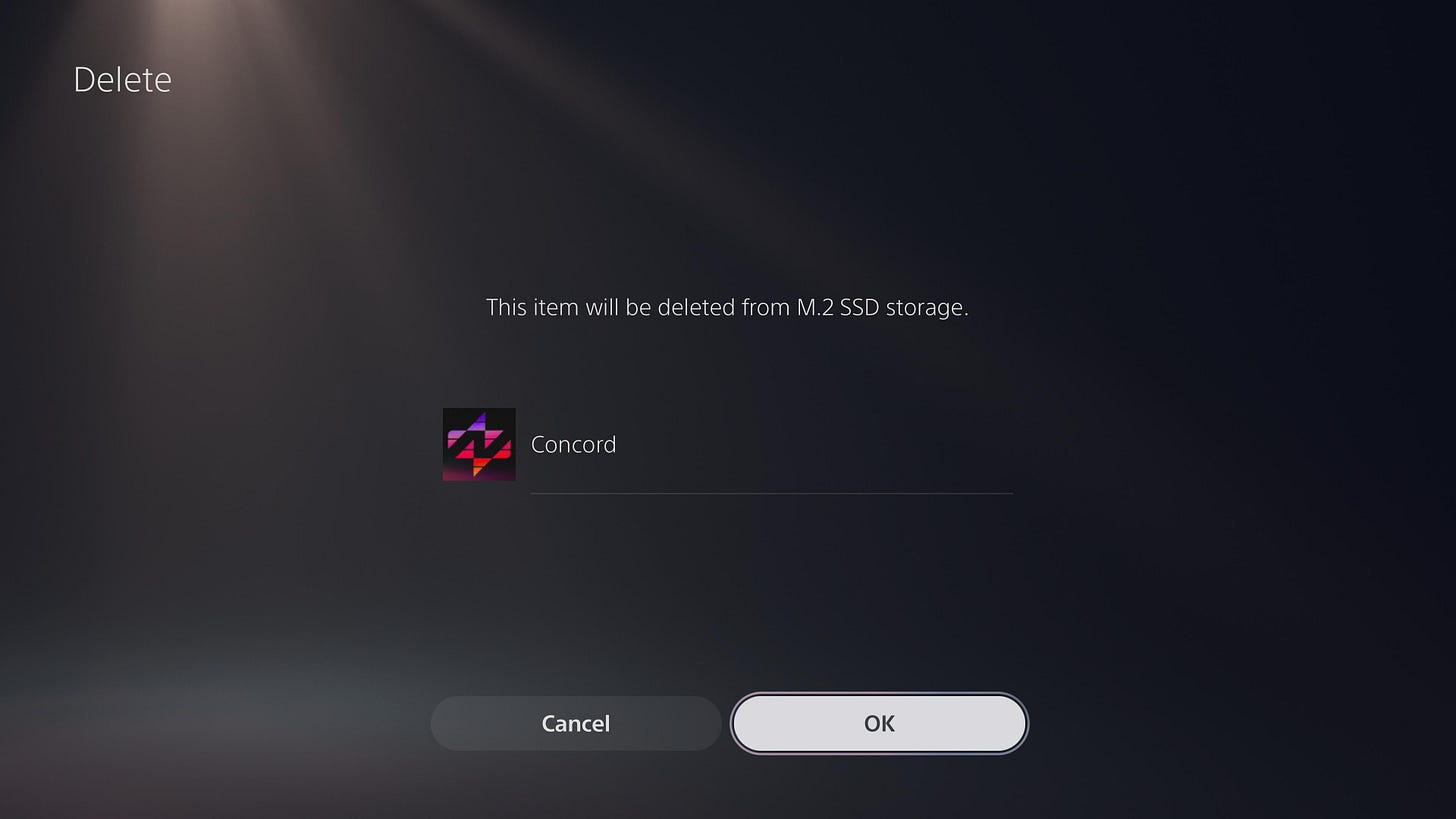Goodbye Concord, we hardly knew ye
And just like that, Firewalk Studios' labour of eight years has shut down without so much as a whimper
“It’s really tempting fate to name oneself after an aircraft with lofty ambitions that eventually crashed, burnt and was taken out of commission,” I had mused to myself when the Concord reveal trailer dropped three months ago. I also recall thinking a few weeks later while playing the closed beta a few weeks ago that there were no real distinguishing characteristics of this game. Well, aside from the fact that each of the Freegunners (playable characters) had their clearly defined preferred pronouns indicated over on the side of the selection screen, it seemed like a run-of-the-mill hero shooter. You had your slow but powerful types, nimble but weaker ones and a panoply of others in between. And there were all sorts of maps over which to wage battle. It was alright, I suppose, and there was certainly potential to do something with these ingredients.
A few more weeks later, the review code for the debut title by Firewalk Studios arrived (thank you, Sony India) in my inbox and I gave it a very brief whirl. Beyond the availability of more modes, a training section and slightly improved visuals, it looked and played pretty much the same as the beta. Other more pressing commitments, sharper deadlines and assorted real-world stuff meant it had to go on the back burner. I’d get around to it eventually, I told myself. And this was fine, because after all, the longer I waited before jumping in, the more players there would be on servers, which would make for more varied and fun matches, I reasoned. In case you missed it when it dropped, here’s the launch trailer from August 23.
Imagine my surprise (and that of around 25,000 who reportedly bought the game) when a missive from Ryan Ellis, game director of Firewalk Studios, popped up on the PlayStation Blog a mere 12 days later. After a brief paragraph about how the studio had been ‘listening closely’ to the feedback from the ‘passionate community that has grown around the game’, came this kicker:
However, while many qualities of the experience resonated with players, we also [recognise] that other aspects of the game and our initial launch didn’t land the way we’d intended. Therefore, at this time, we have decided to take the game offline beginning September 6, 2024, and explore options, including those that will better reach our players. (emphasis added)
The plug had been pulled on Concord in 12 days — a day less than the time it took the late Atal Bihari Vajpayee to dissolve his 1996 Indian government1, if you’re into random trivia. This surrender of sorts from the studio seemed completely unprecedented. Sure, the sales were pretty poor and there seemed to be a very tiny number (relatively speaking) of players who were genuinely excited about the product, but 12 days seemed an awfully short a shelf-life to grant a live-service game — a genre that, by its very definition, relies on being given time to grow and transform.

This seems baffling because the last game I recall being pulled was Cyberpunk 2077 (which was briefly taken off the PlayStation store), and that was because the game shipped in awful condition. The last live-service game I recall that launched to a subpar reception (not solely due to its massive burden of hype) was Marvel’s Avengers, and even that was around for three years before it was taken offline and delisted. Concord suffered from none of these problems: It wasn’t hyped; hell, it was only just announced earlier this year. And it wasn’t broken; in fact, it ran quite well and in an almost entirely bug-free state. The game had reportedly been in the oven for eight years, and so it wasn’t even like this was a rushed cash-grab exercise.
What happened and what’s next?
As much as I’d love to tell you I’ve got the skinny on just what went down behind the scenes over at Firewalk and Sony, I can’t because that would be a dirty lie. At best, I can provide some educated guesses or cultured speculation if you prefer. For starters, it seems like Sony misread the tea leaves, and perhaps overestimated the majority of PlayStation gamers’ appetite for live-service shooters. That overestimation is most likely what drove the publisher and videogame behemoth to acquire Firewalk in April last year.
The world, it seemed, had changed quite drastically in the 17 months between all the optimism shared by PlayStation Studios head Hermen Hulst in the blog post linked above and the seemingly hasty decision to pull the plug. It should be noted that it was that bullishness about the genre that had convinced Sony — hitherto, the home of polished, cinematic and masterful single-player experiences — to hitch its wagon to the live-service-shooter gravy train. And who could blame them? If Fortnite, Apex Legends, Destiny, Overwatch and the rest could be so popular, why not another? Players would probably have jumped at a multiplayer shooter with the finesse and pedigree of titles put out by Sony, right? The logic isn’t all that flawed.
And as I’d mentioned earlier, Concord wasn’t (still seems odd to speak of it in the past tense) outstanding by any metric, but it was far from a bad/unplayable game. The characters came across as rejects from a variety of comic universes (and multiverses, in case you were wondering), as did their hijinks in the infrequent cutscenes. Then there was the price point. That the game was being sold at $40/Rs 2,499 came as a bit of a shock to gamers who were rather more accustomed to their live-service shooters being free-to-play. The promised absence of microtransactions, lootboxes and pay-to-win mechanics mattered little. Finally, powered by social media, a handful of idiots mouthed off about how the game was too woke and that said woke-ness would be the death of it. But this lot was in the minority, because woke-ness wasn’t what killed Concord.
If I was to take a step back, survey the entire corpse and conduct a postmortem, I’d have to say it wasn’t one issue, but rather a variety of issues that together brought us to this pass. Apart from what’s listed above, I’d mention the complete lack of build-up or hype as another cause. Players have to be given a reason to get excited about an upcoming game, and Concord gave them almost none. Where were the teasers? Where were the cinematic trailers? Sure, the player base may still have been indifferent to what turned out to be a very middling game, but at least the marketing could’ve given it a shot at survival, if not success.
Next, it’s the way the game is structured. Relying completely on the multiplayer angle was an issue, in my opinion. Even the much-derided Suicide Squad: Kill the Justice League, a game teeming with red flags, gave players a story campaign and the chance to play solo (with bots in tow). Concord’s gallery of characters could have made more sense and been more appealing had they been fleshed out through a short story mode. Look no further than Call of Duty: Black Ops Cold War’s five-to-six-hour campaign that was extremely memorable, and gave many a reason to play the game — even those who weren’t necessarily all that keen on deathmatches and capturing flags.
Then there’s the lack of a clearly-defined and attractive hook. As I’ve repeated ad nauseam over the past few days, Concord is unfortunately an extremely un-exceptional game, since it lacks even one incredibly cool or differentiating feature (whether in terms of gameplay, presentation, match types etc) that marks it out as a title worth checking out. Still, none of these factors are egregious enough to merit pulling the game after less than two weeks. It’s possible that the game could’ve accumulated some more players in a few weeks. Maybe Sony could’ve pulled some strings for an Astro Bot-esque pick-and-mix of skins depicting various characters from other franchises. Hopefully, details will emerge in the coming weeks and months that shed some light on this very harsh decision.
All that said, whether it was curse of the retired supersonic jet or a combination of the factors listed above, the pulling of a game so quickly is certainly alarming. But on a brighter note, Ellis’ blog entry did refer to “[exploring] options, including those that will better reach our players”, which likely means Concord isn’t completely dead. Perhaps the studio and publisher want to cut their losses on the current form and it’ll return as a free-to-play game or a mobile-first game. There could possibly be a single-player mode tacked on. An interesting new rewards system could be tried out. We’ll have to wait and watch. For now, let’s hope the Concord scenario is a regrettable one-off and doesn’t embolden other studios/publishers to pull the rug out from under a title just because it’s struggling.
Game was being reviewed on PlayStation 5 before it ceased to exist. Review code provided by publisher
The BJP was the single-largest party (with 161 seats) after India’s 1996 Lok Sabha Election. However, an inability to rally support from other parties to reach the magic number of 272 seats (that would ensure a majority) meant that Atal Bihari Vajpayee tendered his resignation 13 days after being sworn in as prime minister.






